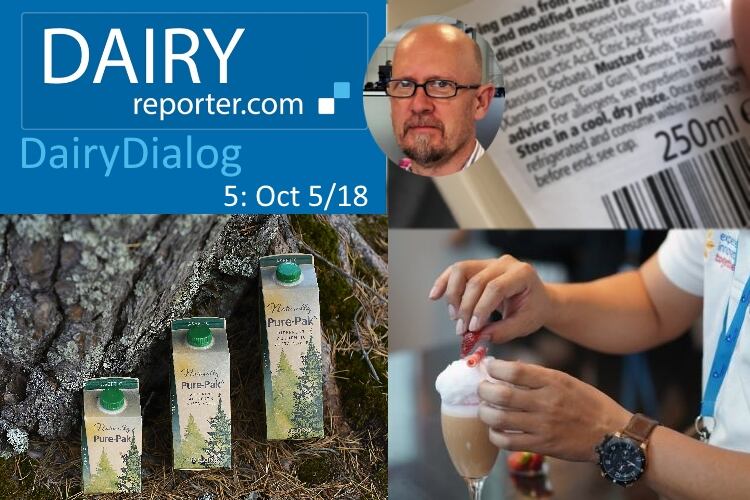We also speak with Luc Steenwelle, product group manager beverages – Asia, for FrieslandCampina Kievit, about the opening of the company’s new Innovation Kitchen in Manila, the Philippines, and Myriam Snaet, from functional ingredients manufacturer BENEO, on their latest research.
New Elopak product
The new Natural Brown Board Pure-Pak cartons are carbon neutral and 100% recyclable, and have been introduced a year after Elopak launched the first fresh gable top carton made from natural brown board. Since its 2017 launch, the fresh carton has been introduced on shelf across Europe for market-leading multinational and medium sized dairies.

The aseptic Pure-Pak cartons have one less layer and thereby retain the natural brown color of the wood fibers, which gives a visible fiber structure. This also results in a reduced carbon footprint and reduced weight, providing a naturally different, sustainable and authentic package that meets demands from growing trends in ethical, ecological and organic products.
The aseptic Pure-Pak carton will be available in one liter, 750 ml and 500 ml sizes, and runs on the E-PS120A aseptic filling machine. The packaging for the previously-launched fresh cartons is available only in one liter and 500 ml variants.
‘Natural feel’
Elopak’s director environment Marianne Groven said, “Elopak has a continuous focus on developing and offering products with an improved environmental profile. The natural brown board is a good example in this respect.
“With this latest launch Elopak is expanding its portfolio, enabling added value UHT milk and ambient juice products, plus new emerging aseptic markets, in order to be sustainable, authentic and naturally different.”
Project leader Johanne Ramdal, said the objective was to transfer the success in the fresh market to new sectors with the technical and commercial release of natural brown board aseptic.
“The most important part for this latest development was to achieve the same natural feel and printing capabilities as the fresh carton, to enable our aseptic customers to maximize the branding and stand out possibilities in ever changing markets,” Ramdal said.
FrieslandCampina Kievit Innovation Kitchen
As reported in DairyReporter earlier this week, Dutch-based FrieslandCampina Kievit, a global manufacturer of beverage and food ingredients, has opened a new Innovation Kitchen in Manila, the Philippines.
The opening was accompanied by a consumer study. The launch of the Philippines’ study and innovation kitchen enables beverage manufacturers in the region to grow their business and innovate together with Kievit, the company said.
The new Kievit Innovation Kitchen is located at the same production facility in Manila where FrieslandCampina produces its beverage creamers, which also houses the company’s sensory lab and other research and development facilities.
BENEO research
New research, commissioned by functional ingredients manufacturer BENEO, shows that consumers pay more attention to what is inside the products they are buying, than to either the product’s description, or the brand name itself.
This highlights the drive by consumers to make healthier choices and shows the continued importance of manufacturers offering cleaner label, product alternatives in their portfolios.
BENEO’s online quantitative clean label consumer survey was carried out with 3,000 consumers from the UK, Germany and the US and the research gives insights into shoppers’ product choices and their preferred ingredients when buying cleaner label products.
The study showed a stronger female bias to those preferring to analyze the ingredients in their products, rather than buy on brand alone. However, the results also show brand is not as important to male purchasers as what is in the product.
Healthy products
Respondents were asked: When shopping for a new product, what do you usually read on the packaging?
• The ingredient list – 51% total, 56% US, 51% UK, 47% Germany (53% female, 49% male)
• The brand – 45% total, 51% US, 43% UK and Germany (48% male, 43% female)
• The product description – 49% total, 51% UK, 49% Germany, 46% US (50% female, 47% male)
When consumers were asked what characteristics they expected from a natural product, 59% expected a natural product ‘to be healthy’, 53% wanted it ‘to not be genetically modified’ and 50% said it should ‘be a quality product’. Also high on the list of expectations for a natural product were for it ‘to have a pure taste’ (44%), ‘be safe’ (40%) and for it ‘to be low in sugar’ (39%).
On pack
With product descriptions seen as important by almost half of respondents, a variety of clean label claims were put to the test on the front of a tomato sauce. The most popular was ‘no preservatives/made with natural ingredients’, with 56% of consumers saying it showed that the product was natural and also that it had a clear, understandable label.
Consumers were also shown three different lists of ingredients for a tomato sauce; one with modified corn starch, one containing rice starch and one with an E-number. 73% of consumers preferred the tomato sauce with rice starch, compared to just 19% with modified corn starch and 8% with an E-number.
Myriam Snaet, head of market intelligence and consumer insights at BENEO, said the research results show ingredients lists are powerful purchasing motivators for consumers and can even be more important than the actual brand of the product.
She said the research also shows consumers combine the words ‘natural’ and ‘healthy’ and as such, food and drink producers need to ensure that the ingredients they are putting on the label are seen by consumers to be ingredients that they can relate to in a positive way.
“The research highlights that BENEO’s newly launched clean label rice starch, Remypure S52, is well placed to help manufacturers create unique textures and excellent product stability, even under harsh processing conditions,” Snaet said.



